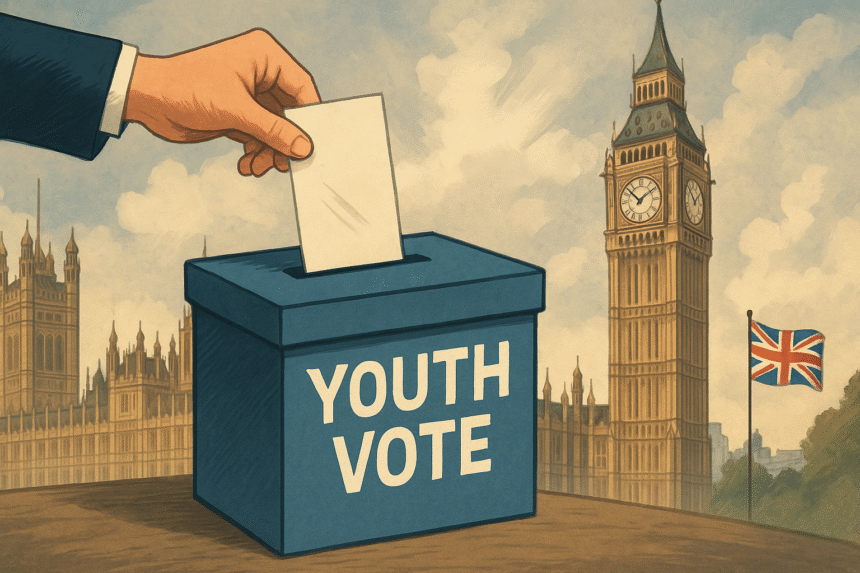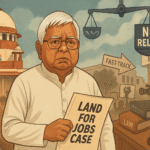“If you’re old enough to drive a car, work part-time, and pay taxes… shouldn’t you also be allowed to vote?”
That’s the hot potato currently sizzling in the political oven of the United Kingdom, where lawmakers are actively debating whether to lower the voting age to 16. This potential reform, once dismissed as a fringe idea, has now moved to the main stage of British politics.
- 🎓 A New Kind of Voter: Meet Generation Z, The Ballot Edition
- 🧠 Why Lower the Voting Age?
- 🧓 But Aren’t 16-Year-Olds Too Young (and TikTok-obsessed)?
- 📜 The Legal Push: What’s Changing in the UK?
- 💡 Why Now?
- 🧮 How Big Is This New Voting Bloc?
- 🌎 How Does the World Handle This?
- 🤯 What Could This Mean for Future Elections?
- 🤖 But Wait… Will AI and Social Media Manipulate These Young Voters?
- 🧠 Final Thoughts: Let the Youth Speak (and Vote)
- 📌 TL;DR (Too Long? Here’s Your Civic Snapshot)
And no, this isn’t just about handing teenagers a voter ID and watching TikToks about Brexit. It’s a serious conversation about democratic evolution, political inclusivity, and whether a 16-year-old with a Snapchat account can also handle the power of the ballot.
Let’s unpack the how, why, and “are-you-sure?” of UK youth voting — and why this could set off a chain reaction across democracies worldwide.
🎓 A New Kind of Voter: Meet Generation Z, The Ballot Edition
If this bill passes, 16-year-olds will officially join the electorate, becoming eligible to vote in general elections, local elections, and possibly even referendums (yes, we’re looking at you, Brexit 2.0).
This isn’t entirely new. In fact:
- Scotland already lowered the voting age to 16 for Scottish Parliament and local elections.
- Wales followed suit in 2021.
- Globally, Austria, Brazil, Argentina, and even Indonesia allow 16 or 17-year-olds to vote.
So, the UK’s potential move is part of a broader trend — one that’s challenging the traditional belief that wisdom comes strictly at 18.
🧠 Why Lower the Voting Age?
Proponents of UK youth voting argue that 16-year-olds today are:
- More politically aware than ever (thanks to the internet).
- Contributing to society — many work, pay taxes, or volunteer.
- Impacted by policies (climate change, education, mental health, etc.).
- Capable of making informed decisions about their future.
If they’re old enough to pay taxes, drive a moped, join the army (with consent), or even get married, why not let them cast a vote?
After all, democracy isn’t a dinner party — it’s a duty, and young people are ready to RSVP.
🧓 But Aren’t 16-Year-Olds Too Young (and TikTok-obsessed)?
That’s the biggest pushback from critics.
The common arguments:
- Immature brain development — are they too impulsive?
- Too influenced by social media and peer pressure
- Lack of real-world experience
- Risk of politicizing schools and teenage communities
To which youth advocates clap back: “Have you met some of the adults who vote?”
(We’re looking at you, Flat Earth Facebook uncles.)
Jokes aside, studies show that young voters take the process seriously, and are less partisan than older generations. Their concerns are typically issue-based, not ideology-based.
So no, they won’t vote for someone just because they have a great Instagram reel (though it doesn’t hurt).
📜 The Legal Push: What’s Changing in the UK?
A bill to reduce the voting age from 18 to 16 has been introduced in the House of Commons, backed by MPs from multiple parties — notably Liberal Democrats, Labour, and even some from Conservatives.
Supporters want this change implemented before the next general election, arguing that excluding 16 and 17-year-olds from decision-making is “undemocratic in the 21st century.”
Key components of the proposed change:
- Lower voting age to 16 for all UK-wide elections
- Encourage citizenship education in schools to prep new voters
- Automatic registration at 16 using school databases or national insurance
💡 Why Now?
Simple. Timing + Momentum.
- The youth climate movement (think Greta Thunberg) has highlighted the voice of young people.
- Post-Brexit regrets among young Britons — many of whom were 16 or 17 in 2016 and couldn’t vote in the referendum that reshaped their lives.
- Political strategists know that Gen Z and young millennials are becoming a dominant demographic, and the sooner they’re engaged, the better.
As one MP quipped:
“You can’t build a future without involving the people who’ll actually live in it.”
🧮 How Big Is This New Voting Bloc?
If the law passes, it’s estimated that around 1.5 million new voters (aged 16–17) will join the electorate.
That’s not just a small dent — that’s enough to swing tight elections, especially in marginal constituencies. So don’t be surprised if campaign vans start showing up near high schools.
And yes, political parties will have to learn what a “BeReal” is and start quoting Taylor Swift in their manifestos. Anything to grab that vote.
🌎 How Does the World Handle This?
Let’s peek at the global report card:
| Country | Voting Age | Notable Notes |
|---|---|---|
| Austria | 16 | First EU country to allow 16+ voting |
| Brazil | 16 | Mandatory voting from age 18 |
| Germany | 16 (local) | Some states allow 16+ in state polls |
| Argentina | 16 | Encourages youth turnout actively |
| UK (current) | 18 | Only Scotland & Wales allow 16+ votes |
Clearly, the UK is playing catch-up in the democratic sandbox.
🤯 What Could This Mean for Future Elections?
Imagine this:
- 16-year-olds debating policy over school lunch.
- Politicians hosting campaign events in TikTok format.
- Manifestos rewritten to include issues like mental health, climate anxiety, and student debt.
In short, elections will no longer be about pension plans alone, but about planet plans.
It might also drive higher overall voter turnout, since early voting habits tend to stick — much like a Netflix password.
🤖 But Wait… Will AI and Social Media Manipulate These Young Voters?
Yes, that’s a valid concern.
- Disinformation campaigns targeting teens are a thing.
- AI-generated deepfakes and fake political ads can be dangerously persuasive.
- Echo chambers on Instagram, X, and TikTok may amplify bias.
Hence, along with expanding the vote, there’s a responsibility to build digital and civic literacy — fast.
Think of it as giving someone a sword. You better teach them how not to swing it at their own foot.
🧠 Final Thoughts: Let the Youth Speak (and Vote)
At the end of the day, democracy is a living organism. If it doesn’t evolve with the people it represents, it starts to rot. Giving 16-year-olds the right to vote is not about coddling kids or ticking progressive boxes — it’s about honoring the future as part of the present.
So, whether you’re 16 or 60, here’s the truth:
The sooner we trust the youth, the sooner they’ll trust democracy.
📌 TL;DR (Too Long? Here’s Your Civic Snapshot)
- The UK is debating whether to lower the voting age to 16.
- Scotland and Wales already allow 16-year-olds to vote in regional elections.
- Supporters cite youth awareness, taxes, rights, and fairness.
- Critics worry about maturity and manipulation.
- If passed, 1.5 million new voters will be added.
- This could reshape UK politics, campaigns, and policies in profound ways.












